Related Research Articles
Cryptozoology is a pseudoscience and subculture that searches for and studies unknown, legendary, or extinct animals whose present existence is disputed or unsubstantiated, particularly those popular in folklore, such as Bigfoot, the Loch Ness Monster, Yeti, the chupacabra, the Jersey Devil, or the Mokele-mbembe. Cryptozoologists refer to these entities as cryptids, a term coined by the subculture. Because it does not follow the scientific method, cryptozoology is considered a pseudoscience by mainstream science: it is neither a branch of zoology nor of folklore studies. It was originally founded in the 1950s by zoologists Bernard Heuvelmans and Ivan T. Sanderson.

Dessert is a course that concludes a meal. The course consists of sweet foods, such as candy, and possibly a beverage such as dessert wine and liqueur. Some cultures sweeten foods that are more commonly savory to create desserts. In some parts of the world there is no tradition of a dessert course to conclude a meal.

The Philippines, officially the Republic of the Philippines, is an archipelagic country in Southeast Asia. In the western Pacific Ocean, it consists of 7,641 islands which are broadly categorized in three main geographical divisions from north to south: Luzon, Visayas, and Mindanao. The Philippines is bounded by the South China Sea to the west, the Philippine Sea to the east, and the Celebes Sea to the south. It shares maritime borders with Taiwan to the north, Japan to the northeast, Palau to the east and southeast, Indonesia to the south, Malaysia to the southwest, Vietnam to the west, and China to the northwest. It is the world's twelfth-most-populous country, with diverse ethnicities and cultures. Manila is the country's capital, and its most populated city is Quezon City; both are within Metro Manila.
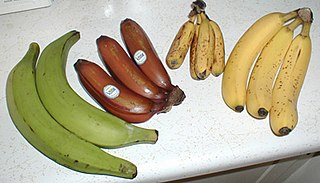
A banana is an elongated, edible fruit – botanically a berry – produced by several kinds of large herbaceous flowering plants in the genus Musa. In some countries, bananas used for cooking may be called "plantains", distinguishing them from dessert bananas. The fruit is variable in size, color, and firmness, but is usually elongated and curved, with soft flesh rich in starch covered with a rind, which may be green, yellow, red, purple, or brown when ripe. The fruits grow upward in clusters near the top of the plant. Almost all modern edible seedless (parthenocarp) bananas come from two wild species – Musa acuminata and Musa balbisiana. The scientific names of most cultivated bananas are Musa acuminata, Musa balbisiana, and Musa × paradisiaca for the hybrid Musa acuminata × M. balbisiana, depending on their genomic constitution. The old scientific name for this hybrid, Musa sapientum, is no longer used.

A scandal can be broadly defined as the strong social reactions of outrage, anger, or surprise, when accusations or rumours circulate or appear for some reason, regarding a person or persons who are perceived to have transgressed in some way a social norm. These reactions are usually noisy and may be conflicting, and they often have negative effects on the status and credibility of the person(s) or organization(s) involved.
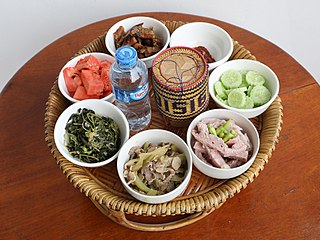
Lao cuisine or Laotian cuisine is the national cuisine of Laos.

Desi is a loose term used to describe the Northern Indic people, cultures, and products of the Indian subcontinent and their diaspora, derived from Sanskrit देश (deśá), meaning "land, country". Desi traces its origin to the Northern Indic people of the South Asian republics of India, Pakistan and Bangladesh, and may also sometimes include people from Sri Lanka, Nepal, the Maldives and Bhutan.

Banana chips are deep-fried or dried, generally crispy slices of bananas. They are usually made from firmer, starchier banana varieties like the Saba and Nendran cultivars. They can be sweet or savory, and can be covered with sugar, honey, salt, or various spices.

Folk art covers all forms of visual art made in the context of folk culture. Definitions vary, but generally the objects have practical utility of some kind, rather than being exclusively decorative. The makers of folk art are typically trained within a popular tradition, rather than in the fine art tradition of the culture. There is often overlap, or contested ground with 'naive art'. "Folk art" is not used in regard to traditional societies where ethnographic art continue to be made.

The culture of Burundi is based on local tradition and common influence with its neighbors.
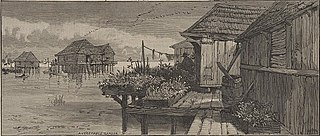
Saint Malo was a small fishing village that existed along the shore of Lake Borgne in St. Bernard Parish, Louisiana as early as the mid-eighteenth century until it was destroyed by the 1915 New Orleans hurricane. Located along Bayou Saint Malo, about 6 miles (9.7 km) east of the Isleño fishing village of Shell Beach, it was the first permanent settlement of Filipinos and perhaps the first Asian-American settlement in the United States.

The Immigration Act of 1917 was a United States Act that aimed to restrict immigration by imposing literacy tests on immigrants, creating new categories of inadmissible persons, and barring immigration from the Asia-Pacific zone. The most sweeping immigration act the United States had passed until that time, it followed the Chinese Exclusion Act of 1882 in marking a turn toward nativism. The 1917 act governed immigration policy until it was amended by the Immigration Act of 1924; both acts were revised by the Immigration and Nationality Act of 1952.
Asian pride is a term that encourages celebration of Asian ethnicity and culture, with various interpretations and origins. In international relations, it can involve advancing Pan-Asianism and critiquing the West. In the United States, it has roots in counter culture, rejecting stereotypes and empowering Asian Americans. The term gained modern use through hip hop culture, promoting a positive stance on being Asian American. The phrase "Got Rice?" emerged as a symbol of cultural identity and pride, often tied to Asian Pride. It humorously references rice as a staple food in Asian cultures. The term was adopted in T-shirt campaigns and seen as a way for Asian Americans to define their identity and counter stereotypes.

The timeline of events of the Spanish–American War covers major events leading up to, during, and concluding the Spanish–American War, a ten-week conflict in 1898 between Spain and the United States of America.
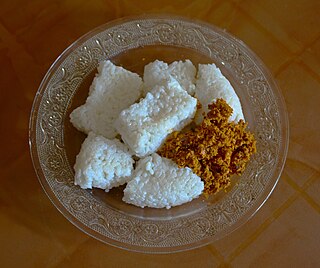
Kiribath is a traditional Sri Lankan dish made from rice. It is prepared by cooking rice with coconut milk, hence this name, and can be considered a form of rice cake or rice pudding. Kiribath is an essential dish in Sri Lankan cuisine. It is very commonly served for breakfast on the first day of each month and also has the added significance of being eaten for any auspicious moment throughout one's lifetime which are marking times of transition. It is one of the more renowned traditional dishes in Sri Lanka.
Baba is an honorific term, of Persian origin, used in several West Asian and South Asian cultures.

Modern Paganism in World Cultures: Comparative Perspectives is an academic anthology edited by the American religious studies scholar Michael F. Strmiska which was published by ABC-CLIO in 2005. Containing eight separate papers produced by various scholars working in the field of Pagan studies, the book examines different forms of contemporary Paganism as practiced in Europe and North America. Modern Paganism in World Cultures was published as a part of ABC-CLIO's series of books entitled 'Religion in Contemporary Cultures', in which other volumes were dedicated to religious movements like Buddhism and Islam.

Anti-Filipino sentiment refers to the general dislike or hatred towards the Philippines, Filipinos or Filipino culture. This can come in the form of direct slurs or persecution, in the form of connoted microaggressions, or depictions of the Philippines or the Filipino people as being inferior in some form psychologically, culturally or physically.

Sojourners for Truth and Justice was a radical civil rights organization led by African American women from 1951 to 1952. It was led by activists such as Louise Thompson Patterson, Shirley Graham Du Bois and Charlotta Bass.
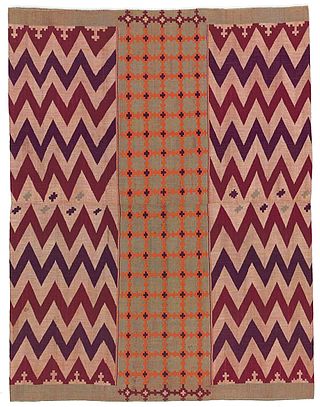
The patadyong, is an indigenous Philippine rectangular or tube-like wraparound skirt worn by both men and women of the Visayas islands and the Sulu Archipelago, similar to the Malong, or Sarong. It was also historically worn in parts of Luzon like Pampanga and Sorsogon.
References
- 1 2 Wren, James Allan (2016). "Banana, Coconut, and Twinkie". In Fee, Christopher R.; Webb, Jeffrey B. (eds.). American Myths, Legends, and Tall Tales: An Encyclopedia of American Folklore, Volume 1. Santa Barbara, Calif.: ABC-CLIO. pp. 74–76. ISBN 978-1-61069-568-8.
- 1 2 3 Tu, Dawn Lee (2011). "'Twinkie,' 'Banana,' 'Coconut'". In Lee, Jonathan H.X.; Nadeau, Kathleen M. (eds.). Encyclopedia of Asian American folklore and folklife. Santa Barbara, Calif.: ABC-CLIO. pp. 88–89. ISBN 978-0-313-35066-5.